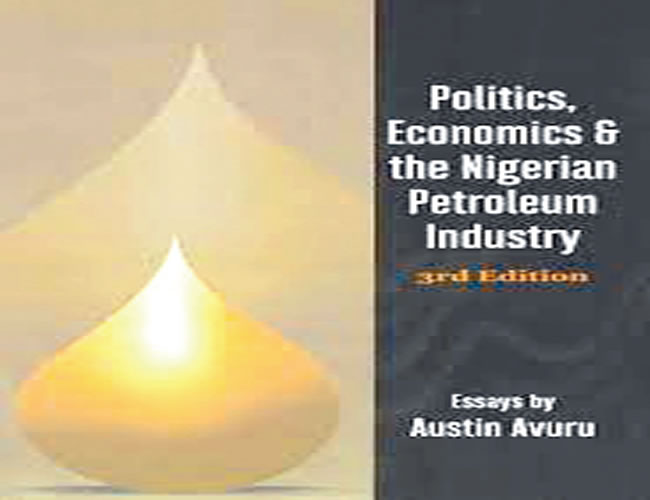A review of Austin Avuru’sPolitics, Economics & the Nigerian Petroleum Industry; RADI8 Ltd, 2022; 474pp by UZOR MAXIM UZOATU.
AUSTIN Avuru’s Politics, Economics & the Nigerian Petroleum Industry (3rd edition) is divided into three broad sections, namely, “Politics & Governance”, “Political Economics”and “The Nigerian Petroleum Industry”, but the offering is best appreciated as a seamless whole. There is no escaping the hard fact that the petroleum industry is at the very heart of Nigeria’s politics and economics.
A methodical and consistent oil man, Avuru is that corporate Mandarin and public intellectual who got engaged in stout opposition to military rule and arbitrariness while persistently clamouring for good governance and the ennobling tenets of democracy. His courageous consistency in the agitation for a private sector-led petroleum industry with increased local participation marks him out as a consummate Nigerian skipper who walks his talk.
The 74 essays that makeup Politics, Economics & the Nigerian Petroleum Industry are daring renditions and exposes taking no prisoners. With Avuru, as espoused in the collected essays, there is no beating about the bush, as the old cliché says.
Born on August 17, 1958, Avuru graduated at the top of his Geology class at the University of Nigeria, Nsukka (UNN) in 1980, and it is indeed remarkable that his recommendation on students’ accommodation in his address as the President of the graduating class, delivered at age 22 on December 12, 1980, became in 2002 the chosen path at an interactive session between President Obasanjo, the Education Minister and Private Sector Financiers.
Avuru has, all over the eventful years of Nigeria, put out his views in the public domain through the media such as The Guardian, ThisDay, Businessday, Financial Standard, PM News, Africa Oil & Gas etc. These original ideas make up the essays collected in this book alongside unpublished memos, public addresses, workshop paper presentations etc. The first articles date back to 1980, while the latest ones were published in 2022.
Avuru’s range in Politics, Economics & the Nigerian Petroleum Industry is quite vast, intervolving what he terms the theory of potholes, the press as its own worst enemy, retired army generals as born-again democrats, the cleavages in his native Delta State, the activism of Concerned Professionals as the opposition party, the need for building a new police force, the tragedy of probes in Nigeria, the country’s peculiar brand of democracy, resource control as a political slogan, the trouble with onshore/offshore dichotomy, the revenue formula, the Electoral Act, constitutional amendment, the ambiguous status of local government councils, parasitism in the polity, spread of poverty, disturbing signals on privatisation, the trouble with foreign investments, deregulation, exchange rate blues, the subsidy trap, budgetary indiscipline, playing politics with power supply, the labour unions in a failed economy, indigenous participation in the Upstream Sector of the Nigerian Petroleum Industry, privatising NNPC’s Downstream operations, the flooding menace etc.
Amid the intimidating vastness of Avuru’s enterprise, there are some pivotal gems to highlight. The primacy of education is crucial to the Avuru agenda as he sets up the foundational role with his alma mater thus: “When in 1954 the legendary Dr. Nnamdi Azikiwe and his close friend, Dr. Okechukwu Ikejiani, started dreaming of a University of Nigeria, the intent was to lay the foundation for future leadership of the country rooted in culturally sound, classical as well as vocational tertiary education.”
Avuru posits education and development in Nigeria as a dream betrayed unlike, for instance, “Singapore’s transformation from Third World to First World in thirty years and subsequent establishment as one of the world’s most attractive investment and tourist destinations was hinged on a solid foundation of carefully crafted educational development programs.”
The betrayal is also evident on the political front, especially with Avuru hopefully seeing the 2007 election of President Umaru Musa Yar’Adua and Vice-President Goodluck Jonathan as the “final exit of the Class of 1932-1942” coup-plotting military men and retired generals taking hold of Nigerian power only for General Muhammadu Buhari to make a return as military President in 2015!
The reason not to despair is that an individual like Avuru in the Nigerian sphere is as ever ready to lead the charge by daring all elements against all odds. The pioneer CEO of Seplat Energy, which he co-founded in 2010, Avuru is the chairman of AA Holdings in the spirit of his book, Politics, Economics & the Nigerian Petroleum Industry, he believes fervently that “it is the aggregate activity of the human capital in harnessing resources that creates wealth.”
Avuru proves that a well-informed individual can make a change through personal example. It is noteworthy that after the Supreme Court ruling on the illegality of first-line charges on the Federation Account, NNPC in May 2002 opened a ‘Cash Call Account’ into which their cash recovery is paid, as suggested in Avuru’s article “Mortgaging the Nigerian Oil Industry” published in ThisDay of March 19, 1997.
An earlier piece entitled “Upstream Divestment: The Real Issues”, published in The Guardian on October 15, 1996, radically swayed the Government’s plan to convert Joint Ventures (JVs) to Production Sharing Contracts (PSCs) as announced by the then Finance Minister Anthony Ani.
Politics, Economics & the Nigerian Petroleum Industry (3rd edition), Essays by Austin Avuru, is worthy of celebration. Anybody who aspires to leadership in Nigeria needs to read this book. I enthusiastically recommend it to all persons and libraries in Nigeria and beyond. It is indeed a treasure trove of inspirational knowledge.
READ ALSO FROM NIGERIAN TRIBUNE






